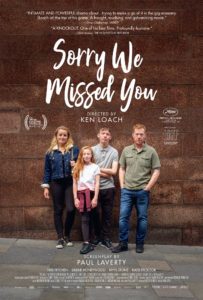‘Sorry We Missed You’ charts the challenges of starting over
“Sorry We Missed You” (2019 production, 2020 release). Cast: Kris Hitchen, Debbie Honeywood, Rhys Stone, Katie Proctor, Ross Brewster, Charlie Richmond, Julian Ions, Sheila Dunkerley, Maxie Peters, Christopher John Slater, Heather Wood, Alberto Dumba, Natalia Stonebanks, Jordan Collard. Director: Ken Loach. Screenplay: Paul Laverty. Web site. Trailer.
Have you ever been so dissatisfied with your circumstances that you were willing to take drastic steps to change them? And, if so, have you ever subsequently found yourself no more fulfilled afterward, despite high hopes going in? What next? Do you formulate yet another new plan, or do you reconcile yourself to the futility of trying and give up on starting over? That’s a tough call, especially for the discouraged, but it’s the reality for a blue collar family seeking a better life in the affecting new drama, “Sorry We Missed You.”
It’s a safe bet that most of those in the working class want to be able to get ahead. So it is with the Turner Family of Newcastle, England. Breadwinners Ricky (Kris Hitchen) and Abby (Debbie Honeywood) put in long hours to provide for their children, Seb (Rhys Stone) and Liza Jae (Katie Proctor). They’ve been trying to save up to buy a home, an opportunity they once nearly realized but that slipped away when the housing bubble burst, forcing them to rent ever since. But, despite the so-called resurgence of the economy, saving enough money for a down payment has been challenging, so much so that, even with two incomes, the dream always seems out of reach.
After years of working in various construction and laborer trades, Ricky has decided to try a new approach – becoming an independent contractor for a package delivery company. Maloney (Ross Brewster), the smooth-talking but hard-nosed manager of the depot out of which he’ll work, paints a rosy picture of the opportunity, deftly qualifying it with an array of euphemistic caveats, most of which carry monetary penalties for failure to comply with expectations. But, with the potential for glittering rewards dangled before him, Ricky decides to sign on.

The Turner Family (from left), Abby (Debbie Honeywood), Liza Jae (Katie Proctor), Seb (Rhys Stone) and Ricky (Kris Hitchen), seek a better life in a challenging economy, as depicted in the new English drama, “Sorry We Missed You.” Photo by Joss Barratt, courtesy of Zeitgeist Films.
From the outset, however, the promise of this arrangement gets thrown into question. For instance, Ricky is given the choice of renting his delivery vehicle or buying one outright. The high purchase price is daunting, even though it would appear to be more economical in the long run than paying on a hefty ongoing lease. But, to make the acquisition, Ricky would need to shell out a significant down payment, one that can only be accommodated by selling Abby’s car, a move that would subsequently require her to use public transportation to get around on her job as a visiting home caretaker for the elderly and disabled, a prospect that upsets her. However, with a basket of optimism behind him, Ricky goes ahead and makes the purchase in hopes that it will get him off to a flying start with this new opportunity.
Before long, though, reality sets in, and Ricky begins to see that the grass isn’t as green as he imagined. Troubles with tight delivery schedules, irascible package recipients, long hours, endless company rules and regulations, and ever-accruing fines for the smallest of infractions take their toll, leaving Ricky perpetually exhausted and burdened by the feeling he needs to keep working despite the hardships. Meanwhile, Abby’s job becomes more onerous as well, given that her commuting time between client visits is longer and out of her control, not to mention the fact that the responsibilities and requirements of her work seem to grow increasingly more demanding.
With Ricky and Abby working so much, life at home becomes more difficult as well. Seb, an artistically gifted but rebellious teen with something of a history of acting out, grows more unruly, skipping school, defying his parents and partaking in petty crime. Liza Jae, meanwhile, a remarkably self-sufficient pre-teen, seeks to hold the family together, helping out Ricky with his delivery route and trying to reason with her older brother. But, no matter how much Ricky, Abby and Liza Jae pull together to maintain the household, matters grow progressively more trying, especially as Seb seeks to assert his independence – and becomes embroiled in ever more trouble.

Breadwinner Ricky Turner (Kris Hitchen) starts a new job as an independent contractor for a package delivery service in director Ken Loach’s acclaimed new drama, “Sorry We Missed You.” Photo by Joss Barratt, courtesy of Zeitgeist Films.
As the Turners’ story unfolds, the situation worsens, so much so that the family’s very survival is threatened. The circumstances raise the question, “Is this living?” Indeed, if this is what it takes to get ahead, one can’t help but wonder whether it’s all worth it, especially since it seems as though the deck is stacked against them in a scrupulously rigged system. Of course, it also makes one wonder how long working class folks are willing to put up with conditions like this. That’s what the Turner Family is up against. How will they respond?
Keeping up with everything that’s going on in today’s fast-paced world is challenging. That can become even more problematic when we’re confronted with a barrage of ever-growing demands, particularly when it comes to trying to strike a balance between our home and work lives. Just ask any parents who dutifully toil away – sometimes in multiple jobs – to make ends meet while caring for their families. Such situations can truly test our mettle. But how much are we willing to put up with?
Circumstances like these often prove to be important life lessons, especially when it comes to managing our personal power. How we fare at that generally has much to do with our beliefs, the building blocks of the conscious creation process, the philosophy that maintains we draw upon these resources in manifesting the existence we experience. So this naturally raises the question, “How are we doing?” It also prompts us to examine what beliefs we have in place to support our positions. Are they adequate for our needs? Are we comfortable wielding the personal power we possess? Or are we coming up short?
Many of us are unaware of just how much personal power we have – or could have. In either case, it all depends on the beliefs we put in place. If we allow ourselves to buy into the notion that we are powerful beyond measure, as author Marianne Williamson put it, there’s no telling what we might accomplish. But, if we see our lives as a struggle, then we’ll constantly experience it as such – until we intentionally decide to contend otherwise.

Visiting home caretaker Abby Turner (Debbie Honeywood, left) attends to one of her clients, Rosie (Sheila Dunkerley, right), in the unflinchingly honest new working class drama, “Sorry We Missed You.” Photo by Joss Barratt, courtesy of Zeitgeist Films.
The Turners’ experience provides a perfect example of this. For years, Ricky and Abby have lived with the clouds of stress and strain perpetually hanging over them, undercutting their dreams and forcing them to keep plugging away for unsatisfying and underwhelming gains. When Ricky decides to become an independent contractor, he takes a step toward asserting his independence and following his desire to do better for himself and his family. But is he fully convinced that his new plan will accomplish that? If he’s unwittingly holding onto beliefs from his old way of thinking, his attempt at establishing a new life won’t bear fruit; the contradiction in his beliefs will undercut his efforts at successfully striking out in a new direction. This is not to suggest that his new undertaking is all for naught; he simply needs to further refine his beliefs to bring about the desired outcome. This will almost assuredly take some honest scrutiny to find the fly in the metaphysical ointment, but, should he succeed at this, he has a bona fide opportunity to pursue his family’s dream of a better life – and even to achieve it.
A key element in this is being able to push aside the belief camouflage that’s obscuring a clear view of the true intentions that are in place. In many cases, we may think we have an accurate perspective on what we’re trying to manifest, but, upon further review, we may well find that undetected ancillary considerations are blocking our view. Oftentimes this involves identifying long-established beliefs that probably took root in our past; they become grounded in our consciousness and hold on relentlessly, even if not obviously, thereby enabling the perpetuation of our creations – and illustrating the power and persistence of our beliefs.
In Ricky’s case, there’s a good chance that those struggle-based beliefs have held on, cleverly concealed and preventing his new intentions from coming into full flower. This becomes evident through the many trials and tribulations that he experiences, both on the job and in his home life, which usually serve to make his work life that much more challenging. It creates a maddening cycle from which escape seems virtually impossible. That’s certainly not set in stone, but, if he genuinely wants out, he must make a concerted effort to change his circumstances by changing his beliefs.

Delivery man Ricky Turner (Kris Hitchen, left) receives assistance from his young daughter, Liza Jae (Katie Proctor, right), on his route, one of the rare times they get to see each other, in director Ken Loach’s “Sorry We Missed You.” Photo by Joss Barratt, courtesy of Zeitgeist Films.
In situations like this, a tool that can be especially helpful is developing our sense of discernment, the ability to critically size up the prevailing conditions to see where the problems lie and where the opportunities for improvement exist. Taking time to deliberately scrutinize the circumstances goes a long way toward accomplishing this, especially when it comes to employing the power of our intuition. As conscious creators are well aware, intuition plays a pivotal role in belief formation, and it’s a tool that’s often underused or dismissed as being unreliable. However, should we purposely employ it more often, taking it seriously despite its seeming “irrationality,” we may find that the faith and trust we place in it pays big dividends.
Learning to trust our intuition is part of an even bigger component of this puzzle – our willingness to move past our fears and live heroically. Charting the waters of the unknown can be daunting, to be sure, yet the opportunities that can best foster our personal growth and development often lie in that unexplored territory. To their credit, Ricky and Abby both seem willing to take a stab at this, even if their steps are somewhat tentative at times. But the example they set provides the timid among us with courageous guidance on how we might consider proceeding, especially if we’re dissatisfied with our circumstances.
All of the foregoing is important given recent events. The global pandemic and the attendant panic that has accompanied it have certainly shaken us to our core, prompting rampant uncertainty about the future. However, as many in the metaphysical community have observed, considering the profound impact these conditions have had and continue to have, we’ve also been presented with an opportunity for groundbreaking change. Since it’s become apparent that we have embarked upon a new normal in which the world we’re entering will be significantly different from what we’re accustomed to, we now have a chance, both individually and collectively, to launch into a new future for ourselves. We have a window open to us to wipe away what no longer serves us. Great changes have already become readily apparent in such areas as crime rates and the environment, emerging with remarkable speed, scope and consistency. So, if change can be effected in ventures as sweeping as these, imagine what else might be possible, particularly in endeavors that hit closer to home. When couched in those terms, Ricky and Abby just might be able to get that house of theirs after all.

At a rare family dinner, the Turner Family (clockwise from left), Ricky (Kris Hitchen), Abby (Debbie Honeywood), Seb (Rhys Stone) and Liza Jae (Katie Proctor, back to camera), get to see one another for a change in the new English drama, “Sorry We Missed You.” Photo by Joss Barratt, courtesy of Zeitgeist Films.
Director Ken Loach’s searingly honest saga about the lengths a working class family must go to in order to make ends meet serves up a damning indictment of a business world lacking in compassion, sensitivity and flexibility. In many ways, this release recalls the filmmaker’s previous offering, “I, Daniel Blake” (2016), a clarion call for greater empathy for those who have needs that must be addressed, especially by sources eminently capable of providing it. The film’s poignancy is particularly relevant under today’s prevailing conditions, especially in matters of making a living and having hope for the future. The picture’s superb ensemble cast and incisive script work together seamlessly to tell a tale of frustration, thwarted dreams and grim truths about a rigged system that keeps even the most industrious laborers from being able to get ahead, no matter how honestly and productively they toil. “Sorry We Missed You” can be an infuriating movie to watch at times, but its honesty and authenticity are undeniable – the kind of story that inspires us all to demand change.
Loach’s latest effort has not gone unnoticed. In the recently completed movie awards season, the picture earned a BAFTA Award nomination for Best British Film, as well as a Palme d’Or nod at the 2019 Cannes Film Festival, the event’s highest honor. The film has screened widely overseas and has played at numerous film festivals. In North America, with the current closure of movie theaters, the picture has been made available for first-run online streaming.

When life’s lemons are so plentiful that it would take a tanker truck to hold all of the lemonade they’d make, it would be easy to give up out of sheer frustration. That’s understandable, but, in the long run, what would that solve? The problems that sparked such a defeatist response would still linger, perhaps getting worse. Instead, rewriting the game plan at least offers the potential for turning things around for the better. Such a venture would likely require some thoughtfulness, creativity, and even a little good, old-fashioned elbow grease, all with the aim of realizing a new hope – and a new future.
Copyright © 2020, by Brent Marchant. All rights reserved.




Leave A Comment